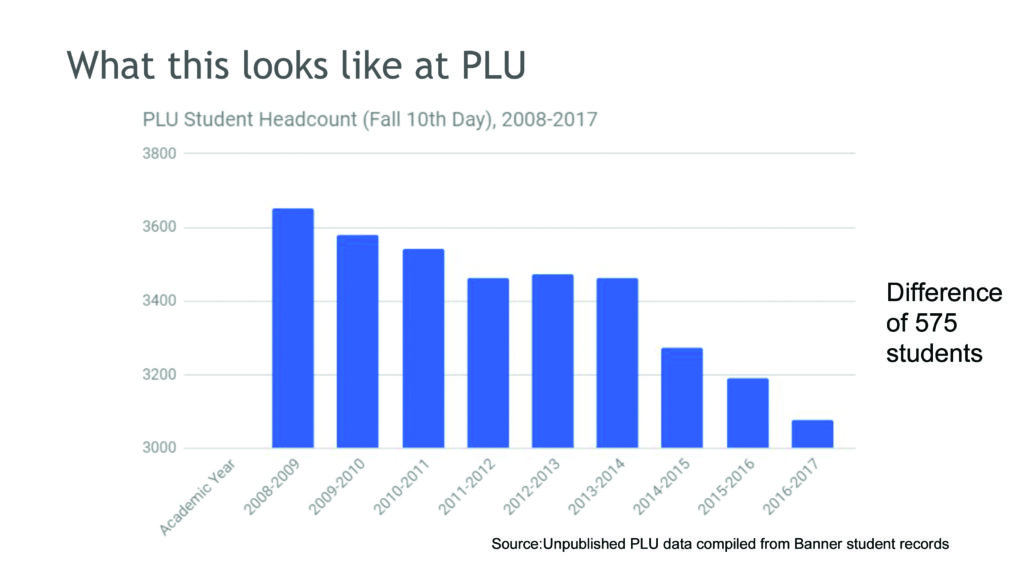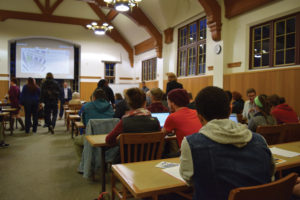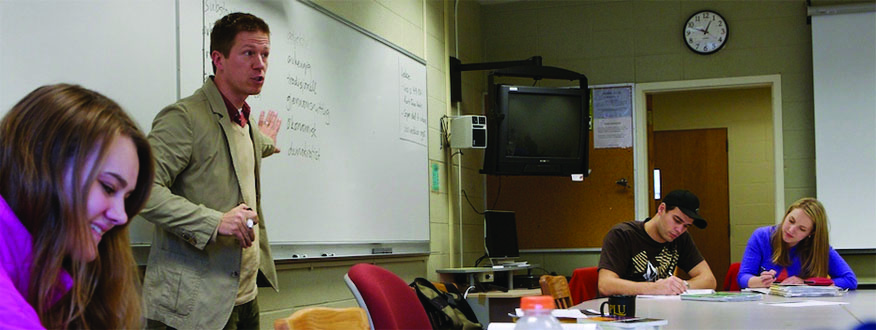MAST STAFF; mast@plu.edu
In late August, Acting President Allan Belton sent a letter to the Pacific Lutheran University faculty regarding a number of administrative cuts proposed by the Faculty Joint Committee (FJC). The letter explained the recent work of the FJC in outlining provisional recommendations on how to curb costs and stabilize PLU’s finances.
The FJC arrived at its recommendations after compiling and analyzing data comparing the cost of academic programs with the profit from student enrollment.
FJC Timeline:
Dec. 2016: FJC convene in response to disproportionate student-to-faculty ratio.
Aug. 24: FJC publishes provisional recommendations for reductions based on internal and external data analysis.
Sept. 19: Faculty from each unit targeted for cuts submit proposals on how to meet or improve the FJC’s recommendations.
Sept. 19 – Nov. 10: FJC reviews proposals sent and possibly refines its recommendations according to faculty suggestions.
Nov. 10: All PLU faculty vote on the elimination of any program (e.g. Classics) at the Faculty Assembly.
Dec. 9: President brings final set of recommendations before the Board of Regents, which will solidify the reductions to be made.
They tasked academic programs (i.e. units and subunits) to review the recommendations and return proposals by Sept. 19 on how each might implement such reductions. The FJC also welcomed faculty to offer counter-suggestions to those outlined in the provisional recommendations for their respective units.
The FJC—with additional input from the provost—will use these proposals to finalize its recommendations before turning them over to the president. The president will then bring these recommendations to the Board of Regents, which will convene Dec. 9 to vote on the proposed changes.
The Faculty Joint Committee
The Faculty Joint Committee brings together over 20 faculty representing each school and division across campus. Three separate committees comprise the FJC: the Rank and Tenure Committee, the Educational Policies Committee and the Faculty Affairs Committee.
Faculty members who serve on these committees are elected by their peers and work to recommend policies pertaining to promotion, education and well-being of the faculty. Associate Professor of Philosophy Keith Cooper and Associate Professor of Biology Amy Siegesmund co-chair the FJC.
Thomas Krise convened the FJC in Dec. 2016 in response to a decline in student enrollment, which caused a disproportionate ratio of students-to-faculty on campus. An unusual dip in returning students exposed a steady decrease in enrollment over eight years, dropping from nearly 3,700 students in 2008 to 3,069 students in 2016.
Meanwhile, faculty numbers slightly increased over the same period of time, with more faculty teaching fewer students.
“When we started this process, that was the big ah-ha moment for the university,” Belton said.
Belton said the loss of 575 students over eight years totals approximately $11.5 million lost in revenue from tuition. The result is a disproportionate cost-to-benefit balance, which requires reallocating funds from tenured and tenure-track faculty positions.
After convening in 2016, the FJC went to work on conducting an internal analysis of all 42 academic units and subunits at PLU. The data compared the demand for programs, as reflected by student credit hours, against the cost to run each program according to faculty work hours.
In addition to internal data collection, PLU contracted the Austen Group—an institutional research firm—to run a similar but broader analysis. The Austen Group investigated what students say they want to major in before arriving at PLU, what [degrees] they end up graduating with and what programs are currently popular in the region.
The FJC used both its own internal analysis and the Austen Group’s findings to formulate its provisional set of recommendations provided to the PLU campus community in August.

The Recommendations
The provisional recommendations propose to cut approximately 31 tenure and/or tenure-track faculty positions across 24 academic units and subunits. The recommendations also suggest the elimination of several subunits and degree offerings.
The Division of Humanities sees the most faculty reductions with nine proposed cuts, while the Division of Natural Sciences observes the least with three cuts.
Associate Director of Choral Studies Brian Galante said the numbers, while expected, still had an unsettling effect.

“I do think it was a surprise that, in the case of music, the number was as high as it was,” Galante said. “Certainly, nobody expects to get out of this and not be asked to do reductions or find efficiencies. But to be recommended to eliminate three full-time equivalencies, it was a surprise to a lot of us.”
In addition to blueprinting possible faculty reductions, the provisional recommendations also supply a list of qualitative questions that prompt units to contemplate how reductions will reconfigure structures within programs.
The FJC also asked specific units to explain the value of non-academic program aspects. The Music department was asked to describe the value of its accreditations and five choirs. Galante said these questions were designed to help units clarify the makeup of their departments and advocate for essential elements.
“[Accreditation] gives our graduates, who want to perhaps go into graduate school or continue with certain performing organizations, that expectation of quality, of curriculum [and] of training, so they can go into those jobs,” Galante said.
Cooper emphasized the reductions as a faculty-led process focused on re-aligning academic programs and gaining financial stability for the university.
Academic re-alignment may include the elimination of the Classics subunit, as well as the Master of Fine Arts in Creative Writing, Master of Finance and Master of Science in Marketing Research degrees. Propositions for these or other programs to be eliminated must be voted on by the full faculty at the Faculty Assembly Nov. 10.
“It’s not accurate to call this a budget crisis. This is a budget exercise. Our budget is in balance.”
-Joanna Gregson, Acting Provost
Professor of Classics Eric Nelson does not agree with the FJC recommendations, saying they do not reflect current enrollment in Classics courses at PLU.
Nelson said both the Latin and Greek classes are a part of Classics, but their codes appear outside of the CLAS code during registration. Classics, Nelson said, also offers combined classes, which are taught during the same class period.
“If we have three students that are in GREK 211 and five that are in GREK 311, it shows up as two low enrolled courses,” said Nelson.
Additionally, Nelson said cross-listed classes are often taught by Classics professors but are not included under the Classics listing, making it appear as if Classics professors aren’t contributing to the university on as large of a scale.
Classics Major Zanthia Dwight, senior, said cutting the Classics subunit is a mistake on PLU’s part. Cutting the program, she said, would be a detriment to PLU’s appeal to prospective students.
“I’m pretty upset, but I understand that PLU has to make…budget cuts. But I do not think the Classics need to be cut,” Dwight said. “PLU’s competition is looking nicer everyday if they don’t keep that program.”
Classics and Philosophy double major Ashley Mindrich, a senior, said Classics provides invaluable material to the humanities as a whole.
“It has the most material that integrates with the humanities,” Mindrich said. “You can’t read anything that Liberal Arts teaches without the Classics.”
Whatever the final recommendations are, Acting Provost Joanna Gregson, faculty and administration remain committed to approaching all reductions with sensitivity and consideration.

“Our commitment as administration and faculty is caring for each other,” Gregson said. “We’re going to do this the best PLU that we can, which is that we’re going to care for our faculty and our students.”
The Effects
Once finalized by the Board of Regents, reductions will occur over the next two to three academic years.
The FJC’s provisional recommendations identify 31 positions for elimination, but Cooper said the final number will likely be larger. Gregson said retirements will constitute a portion of eliminations. The rest will be determined by seniority, with priority going to those who have worked at PLU the longest—a system outlined in the Faculty Handbook.
Come December, Belton said any students currently enrolled in programs marked for elimination will be fully able to complete their degrees. However, further enrollment for those programs will be closed moving forward. Gregson said the Office of Admissions will be standing by ready to inform prospective students about the curriculum changes following the Board’s decision.
Belton and Gregson said current students shouldn’t expect to see any large-scale changes in the immediate future.
“The effects of this are going to be felt several years out. You’re not going to notice a difference in your time at PLU,” Gregson said. “This is moving PLU forward.”
It is currently unknown how faculty and program cuts will affect general education and interdisciplinary programs in the years ahead. However, Gregson assured that PLU will remain a liberal arts university despite possible cuts to programs like Classics.
FJC Student Forums:
FJC Process & Student Engagement
12 p.m. Oct. 9, Kriedler Lounge
10:30 a.m. – 11:05 a.m., AUC 133
Diversity & Investment in the Student Experience
6 p.m. Oct. 11, Karen Hille Phillips 201
“Every person who works here—faculty, staff, the administration and the Board of Regents—is committed to PLU being a liberal arts university,” Greson said. “There are different ways of doing liberal arts, but we’re not going to lose the humanities.”
Siegesmund said, even now, she sees faculty brainstorming creative solutions for reimagining various curriculum to keep interdisciplinary programs strong.
“I think it’s important to underscore how valuable our curriculum is to faculty, how much responsibility we feel for it and how much care we feel for it,” Siegesmund said. “In days that could be dark if you let them be, it’s pretty inspiring to hear my colleagues talk [creatively] and to really be thinking that way instead of just saying, ‘I’m going to protect my own [department].’”
Gregson stressed that the FJC’s recommendations for university reductions are not a symptom of budget crisis. The recommendations, she said, are instead a proactive effort on behalf of PLU to respond to a changing educational climate.
“This is a budget exercise. Our budget is in balance,” Gregson said. “We’re spread too thin to fully invest in the things that are priorities.”
At the end of the three year transition, Gregson said she hopes future students will find a sustainable university that more adequately meets student demand.
The Student Perspective
Gregson said the recommendations ultimately reflect students’ interests, as indicated by the classes, majors and minors Lutes have enrolled in over the years.
“Students have been involved, you just didn’t know it,” Gregson said. “You’ve given us input into what curriculum matters to you with your footsteps.”
Classics major Rachel Dixon, junior, said she’s concerned about student’s ability to influence the recommendations moving forward.
“I would ask the FJC, the president, provost, anyone involved in this decision, to listen to the students because we’re the ones going here and paying for our education,” Dixon said. “They may have particular ideas about what students want. But if they don’t listen to what we literally tell them what we want, they’re going to lose students because of it.”
Belton, Gregson and the FJC are working in collaboration with Associated Students of PLU to educate students on the FJC process, recommendations and future impact. A series of forums sponsored by ASPLU will endeavor to incorporate student voices and action.
“I’m pretty upset, but I understand that PLU has to make…budget cuts. But I do not think the Classics need to be cut.”
-Zanthia Dwight, senior
ASPLU President Hillary Vo said student input and advocacy are still critical at this stage. Student voices, she said, can still have an impact so long as students are willing to participate.
“If you really care about a professor, you’ll do something more than fill out evaluations,” she said. “You’ll write a letter to the FJC, you’ll write a letter to the Board of Regents, you’ll go to the forums.”
A number of students, including junior Warren Neely, are still uncertain of the details surrounding the committee and its recommendations.
“I am very confused because I didn’t even know the committee was a thing,” Neely said. “It makes me feel distraught because I don’t want faculty to lose their jobs.”
First-year transfer Grace Amsden said she’s interested in seeing more information provided to students in the coming months.
“Coming into PLU, I can tell that there is a lot going on and some things that i’m not currently well informed on. However, I would be interested in seeing information provided to students about such significant information regarding [departments] having cuts,” Amsden said.
Vo said, at its core, she believes PLU holds the same commitment to quality education and care despite the proposed reductions. While the cuts are uncomfortable, Vo said she trusts PLU to follow through in its promise to produce successful students.
“PLU still cares about students, and we’re working to make this a safe space for students where those values are still shared,” Vo said. “PLU is [just] doing what it needs to do, and it kinda sucks.”
Reporting was led by Brooke Thames. Sarah Cornell-Maier, Rhiannon Berg, Rizelle Rosales, MacKenzie Kintigh, Paris Franklin and Hannah Soltis made significant contributions.




















